H S Vishnoi Solutions for Exercise 2: Review Questions
H S Vishnoi Biology Solutions for Exercise - H S Vishnoi Solutions for Exercise 2: Review Questions
Attempt the practice questions from Exercise 2: Review Questions with hints and solutions to strengthen your understanding. Concise Biology Part-II Class 10 solutions are prepared by Experienced Embibe Experts.
Questions from H S Vishnoi Solutions for Exercise 2: Review Questions with Hints & Solutions
Briefly explain how the rate of transpiration is affected by temperature.
Given below is the diagram of an apparatus used to study a particular phenomenon in plants.
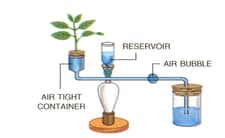
Name the apparatus.
What is it used for?
What is the role played by air bubbles in this experiment?
What is the reservoir?
What happens to the movement of air bubbles if the apparatus is kept in i) Dark, ii) In sunlight, iii) In front of fan.
Given ahead is the diagram in an experimental set up to study the process of transpiration in plants. Study the same and then answer the questions that follow.
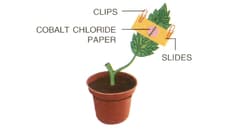 :-
:-
Name the colour of dry cobalt chloride.
Is the experimental leaf is dicot or monocot? Give a reason in support of your answer.
Why are glass slides placed over the dry cobalt chloride papers?
After about half an hour what change, if any, would you expect to find in the cobalt chloride paper places on the dorsal and ventral sides of the leaf? Give a reason to support your answer.
An outline sketch of a tree is shown in a diagram below. Study the name and answer questions that follow.
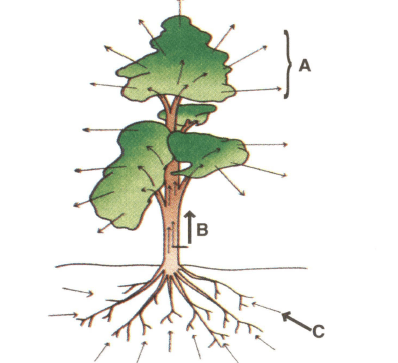
Write the significance of the process mentioned in A for the plants.
An outline sketch of a tree is shown in the diagram below. Study the name and answer questions that follow
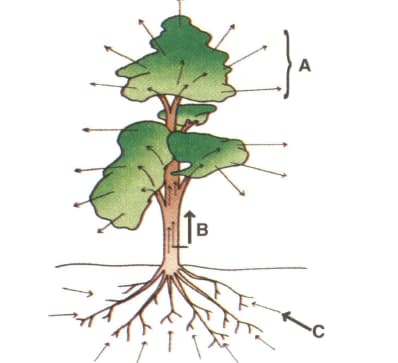
What do the direction of an arrow in B and C indicates? Name the phenomenon.
The given below represents an experimental set up with a weighing machine to demonstrate a particular purpose in plants. The experimental set up was placed in the bright sunlight. Study the diagram and answer the following questions.
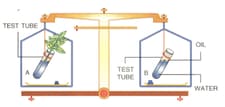
Name the process intended for study.
Define the above-mentioned process.
When the weight of the test tube A and B are taken before and after the experiment. What change is observed? Justify?
What is the purpose of putting oil in the test tube?
An apparatus as shown below was set up to investigate a physiological process in plants. The set up was kept in the sunlight for two hours. Droplets of water were then seen inside the bell jar. Answer the questions that follow.
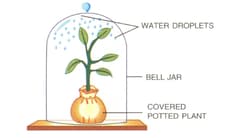
Name the process being studied.
Explain the process named above (a)
Why was the pot covered with a plastic bag?
Suggest a suitable control for the experiment.
Mention two ways in which this process is beneficial to plant.
The apparatus shown in the following diagram is Garreau's potometer designed to demonstrate unequal transpiration from the two surfaces of a dorsiventral leaf. Equal amounts of calcium chloride (CaCl2) were taken in two vials, which were placed in two cups. The leaf was placed between the cups. The ends of the cups were closed with corks through which two mercury manometers were connected. After a few hours, CaC12 vials were taken out and weighed again.
. 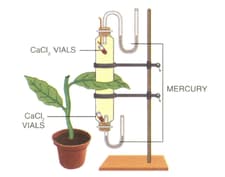
What is the purpose of keeping Cacl3 vials inside the cups?
After few hours Cacl3 vials were taken out and weigh again. Will you expect any differences in weight? If so give a reason.
What was the use of manometer?
What do you mean by transpiration?
